Algeria Crypto Cost Calculator
Inflation Impact
With Algeria's 12% annual inflation rate (as of 2024), your money will lose value over time.
Your DZD will be worth 0 DZD after 0 months
Crypto Savings Potential
With stablecoins like USDT, you avoid inflation risk but face 10-25% price premium due to illegal trading.
This represents the additional cost of trading crypto illegally in Algeria.
USDT value: 0 DZD
Potential penalties for crypto activities:
Using cryptocurrency in Algeria under Law No. 25-10 is a criminal offense. All calculations below are educational only. This tool does not provide legal advice or guarantee safety.
Algeria didn’t just regulate cryptocurrency in 2025-it erased it. On July 24, Law No. 25-10 made every single crypto-related activity a crime. Holding Bitcoin? Illegal. Buying Ethereum? Illegal. Even posting about crypto on social media? Illegal. The government didn’t just crack down-it shut the door, locked it, and threw away the key. And yet, crypto didn’t disappear. It went underground.
The Law That Banned Everything
Before July 2025, Algeria had a vague ban on crypto since 2018. No one really enforced it. People traded on local platforms. Some even mined. It wasn’t legal, but it wasn’t dangerous either. That changed with Law No. 25-10. This wasn’t a tweak. It was a total wipeout. The law lists eight criminal acts:- Issuing new tokens
- Buying or selling digital assets
- Using crypto as payment
- Holding any cryptocurrency
- Trading for profit
- Promoting crypto online
- Running exchange platforms
- Mining
How People Still Trade Crypto
You’d think a ban like this would kill crypto. But it didn’t. It just made it harder. People still trade. They just don’t do it in the open. Here’s how:- Peer-to-peer (P2P) networks: Friends trade with friends. Someone in Algiers buys Bitcoin from someone in Oran using cash. No platform. No trace. Just meet in a café, hand over money, and get a private key.
- International exchanges: Users access Binance, Kraken, or OKX through VPNs. They deposit fiat via third-party payment agents-often friends or family abroad-and withdraw crypto. No Algerian bank is involved.
- Stablecoins like USDT: These are the real lifeline. USDT trades for Algerian dinars on P2P networks. People use it to preserve value. If the dinar drops 10% in a month, USDT holds steady. It’s not speculation-it’s survival.
- Privacy coins: Monero and Zcash are growing in popularity. They’re harder to track. If you’re going to break the law, you want to stay hidden.
The Hidden Costs of Illegal Crypto
Trading crypto in Algeria isn’t like trading in the U.S. or Nigeria. It’s risky, expensive, and exhausting.- Price premiums: Because supply is limited and risk is high, Bitcoin trades at 10-25% above global prices. You pay extra for the danger.
- No protection: If someone scams you, you can’t report it. No police. No court. No recourse. You lose everything.
- Security overhead: You need encrypted apps, burner phones, and VPNs. You can’t use your real name. You can’t post screenshots. You can’t even talk about it openly.
- Slower transactions: Finding a buyer or seller takes days. You can’t just click ‘buy.’ You need trust, references, and patience.

Who’s Left in the Market?
The underground market isn’t for everyone. It’s for people who have no other options.- Young professionals: Engineers, programmers, students. They understand tech. They know how to use wallets and VPNs. They’re the backbone of the underground network.
- Export workers: Algerians working abroad send money home. Crypto is faster and cheaper than Western Union. They convert dollars to USDT, send it to family, who cash out in dinars via P2P.
- Small business owners: Some import goods from Turkey or China. They pay suppliers in crypto to avoid currency controls and bank delays.
- Investors: People who bought crypto before 2025 and refuse to sell. They hold, hoping for a future reversal.
What the Government Is Doing
Algeria’s enforcement is selective. They’re not raiding homes every week. They’re focused on big players: exchange operators, promoters, and organized traders. In October 2025, authorities shut down two underground trading hubs in Constantine and Tizi Ouzou. Three people were arrested. One was accused of running a Telegram group with 1,200 members. He got 10 months in jail. But small-time traders? They’re mostly ignored. Why? Because chasing them is hard. And expensive. The government doesn’t have the resources to monitor every WhatsApp group or P2P meeting. Still, the threat is real. A neighbor could report you. A friend could get caught and name you. A digital footprint-like a login to Binance-could be traced. People live in constant low-grade fear.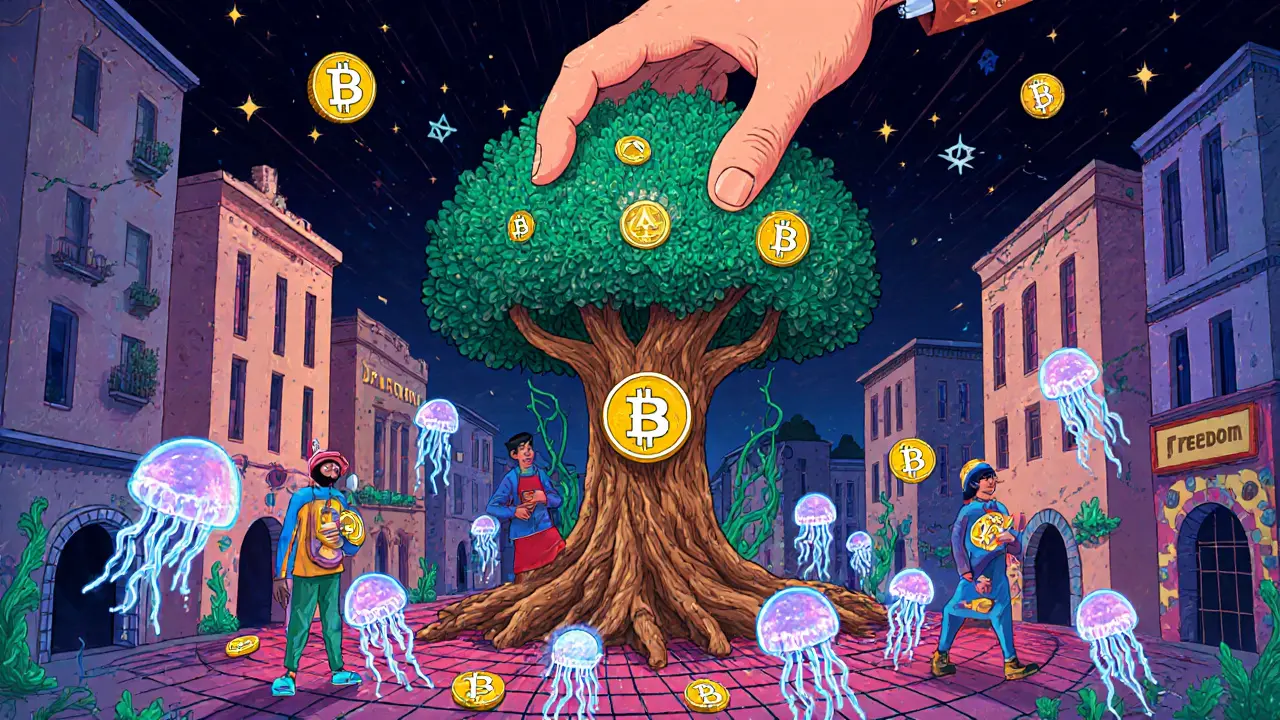
Will This Ban Last?
History says no. Bans like this rarely work. China banned crypto in 2021. Mining disappeared. But P2P trading exploded. Today, China is one of the largest crypto markets in the world-just hidden. Algeria’s ban is even stricter. But the demand is stronger. The economy is struggling. The youth are connected. Technology keeps evolving. Experts believe the underground market will stabilize-not disappear. It’ll be smaller. More technical. More dangerous. But it’ll keep running. The real question isn’t whether crypto will survive. It’s whether Algeria can afford to keep fighting it. Every dinar spent on surveillance, arrests, and court cases is a dinar not spent on education, jobs, or infrastructure. And every Algerian who uses crypto to protect their savings is a reminder that control doesn’t always work.What Happens Next?
Three paths are possible:- Stay banned: The government doubles down. Enforcement gets harsher. More arrests. More fear. Crypto becomes a niche of the ultra-tech-savvy.
- Loosen up: Facing economic pressure, Algeria quietly allows stablecoin use for remittances. No public announcement. Just tolerance.
- Reverse course: A new government, or a crisis, forces a rethink. They legalize crypto under strict rules-taxes, licenses, KYC. It’s unlikely in the next two years, but not impossible.
Algeria’s underground crypto market isn’t a rebellion. It’s a response. A quiet, desperate, technical response to a broken system. People aren’t doing it because they love Bitcoin. They’re doing it because they have no other way to survive.
Is it illegal to hold cryptocurrency in Algeria?
Yes. Under Law No. 25-10, enacted in July 2025, simply holding any cryptocurrency-Bitcoin, Ethereum, USDT, or others-is a criminal offense. The law explicitly bans possession, regardless of how you acquired it or whether you intend to trade it.
What are the penalties for using crypto in Algeria?
Penalties range from 200,000 to 2 million Algerian dinars (about $1,500 to $14,700) and up to one year in prison for first-time offenses. Repeat violations double the fine and jail time. Promoting crypto online-even posting about it on social media-is also punishable under the law.
Can Algerians still buy Bitcoin legally?
No. All legal channels for buying, selling, or trading cryptocurrency were shut down by the July 2025 ban. Any current transactions occur underground through peer-to-peer deals, international exchanges accessed via VPN, or cash exchanges-none of which are legal under Algerian law.
Why do people still use crypto despite the ban?
Many use crypto to protect savings from hyperinflation and currency devaluation. The Algerian dinar lost value rapidly in 2024-2025. Stablecoins like USDT offer a way to preserve wealth. Others use it to receive money from family abroad, bypassing slow or restricted banking channels.
Is mining cryptocurrency illegal in Algeria?
Yes. Mining is explicitly banned under Law No. 25-10. Operating mining equipment-even with your own electricity-is considered a criminal act. Authorities have seized mining rigs in multiple cities since the law took effect.
Can Algerians use crypto for international payments?
Technically, no. But some do, using P2P networks and third-party intermediaries. For example, a small business owner might pay a Turkish supplier in USDT sent via a friend in France. While risky and illegal, this method avoids the delays and restrictions of official banking channels.
How does Algeria’s crypto ban compare to other countries?
Algeria’s ban is among the strictest in the world. Unlike China, which banned exchanges and mining but tolerated personal holdings, Algeria criminalizes possession. It’s similar to Egypt’s 2023 restrictions but more comprehensive. Few countries have made holding crypto a criminal offense.
What happens if you’re caught with crypto in Algeria?
If authorities discover your crypto holdings-through bank records, device searches, or informants-you can be arrested. Your devices may be seized, and your assets frozen or confiscated. You’ll face criminal charges, fines, and possible jail time. There is no legal process to reclaim your crypto.
Are there any safe ways to use crypto in Algeria?
There are no safe or legal ways. Even using a VPN to access an exchange or trading via P2P carries legal risk. The only way to avoid penalties is to stop using crypto entirely. Those who continue do so at their own risk, with no legal protection or recourse.
Will Algeria ever legalize cryptocurrency?
It’s unlikely in the near future. The government sees crypto as a threat to financial control. But if inflation worsens, remittance flows dry up, or youth unrest grows, pressure may force a policy shift. Any legalization would likely come with heavy regulation, not freedom.
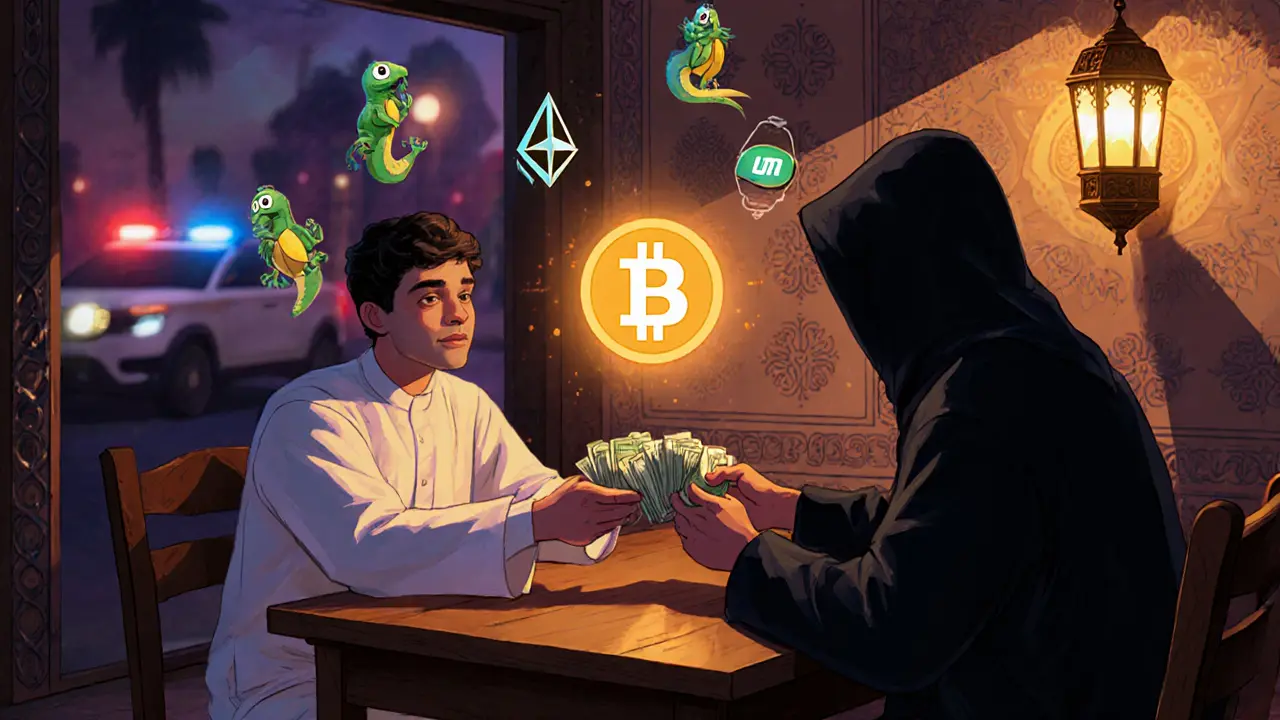




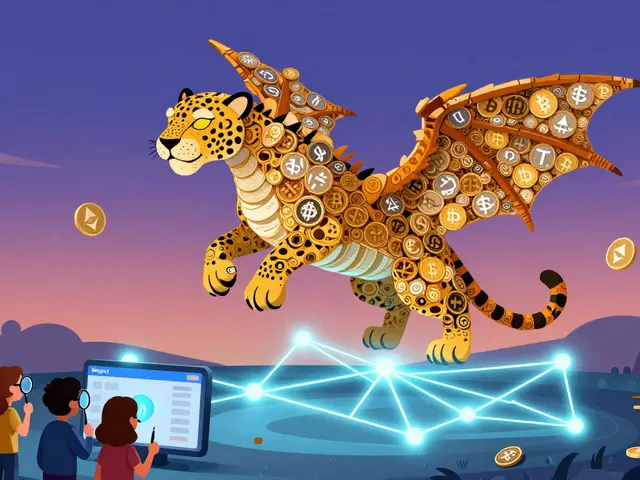
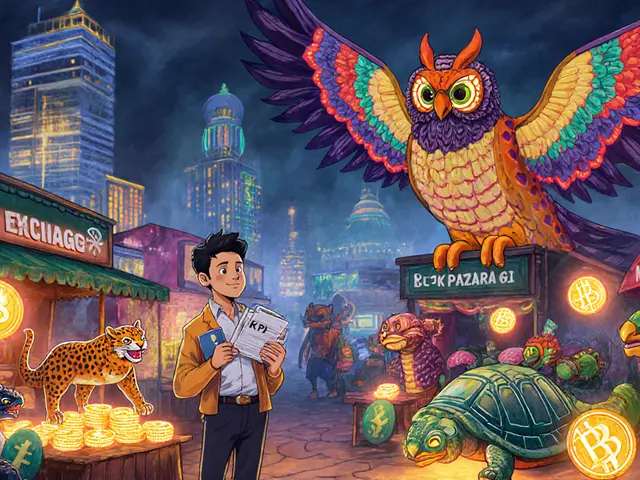
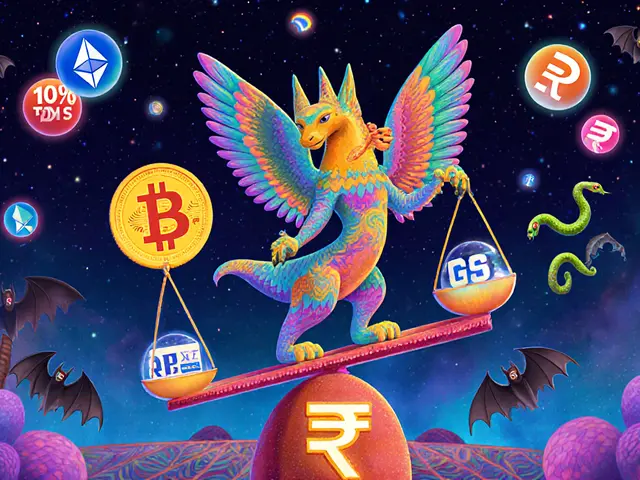



20 Comments
So they banned crypto and now everyone's just using cash in cafés? Cool. Next they'll ban oxygen and we'll all be smuggling air in mason jars.
This is the most realistic look at underground crypto I've seen in a while. The P2P dynamics, the stablecoin lifeline, the risk premium-it all tracks. People aren't trading for gains, they're trading for survival.
Why does Algeria think banning tech will fix inflation? They're not stopping the dinar from collapsing-they're just making the only escape route illegal. This is like banning lifeboats during a flood.
Theyre watching your phone theyre tracking your vpn theyre listening to your whatsapp theyre waiting for you to slip up its not about money its about control and you think youre safe but youre not
The fact that young engineers and export workers are keeping this alive is wild. This isn't crypto bros. This is people fighting for their future with a burner phone and a prayer. Respect.
Man i just cant believe people are still doing this. Its so risky but also so brave. If i was in algeria id be right there with them trying to protect my savings. no judgment just pure respect
The irony is palpable. A state that claims to protect its citizens from financial risk is forcing them into far greater risk by eliminating all legal alternatives. This is not economic policy. It is technological authoritarianism.
Honestly this is one of those things that makes you realize how much we take financial freedom for granted. If your money can disappear overnight and you can't move it, what's left? Crypto isn't the problem. The system is.
Oh please. People are just using crypto because they're too lazy to learn how to save properly. If you can't handle inflation, maybe don't buy things you can't afford. This isn't a revolution. It's bad financial literacy.
I'm crying. Not because of the ban. Because people are still trading. In secret. With fear. With courage. This isn't a market. It's a silent war. And the soldiers are 19-year-olds with iPhone wallets.
The real tragedy isn't the ban. It's that the government doesn't even realize they're creating a generation that trusts technology more than their own country. That's the real loss.
You know what this reminds me of? The prohibition era in the US. They banned alcohol and suddenly everyone was making moonshine in their basements. The difference is alcohol was a vice. Crypto is a tool. And you can't ban a tool without banning the future. The state is fighting the internet. And the internet always wins.
I feel it. The fear. The quiet panic. The way you check your phone three times before opening a wallet. The way you delete your history. The way you whisper about USDT like it's a sacred secret. This isn't finance. This is survival in a dystopia. And we're all just watching from our cozy apartments.
The state's logic is fundamentally flawed. It assumes that by controlling the medium of exchange, it controls economic reality. But reality is not bound by legislation. It is bound by human need. And human need always finds a path.
So they banned crypto but inflation is still rising? What a surprise. The ban is just theater. A distraction. They're not protecting the economy. They're protecting their own power. And the people? They're just collateral damage
You think this is bad? Wait till they start banning private keys. Then what? You gonna memorize your seed phrase in your head? And then theyll ban memory. Thats the next step. Theyre not banning crypto. Theyre banning freedom
I wonder how many of these people are just holding from before the ban. Like, they bought BTC in 2021 and just never sold. Now they're sitting on it like a relic. Not trading. Not moving. Just waiting. For what? A miracle? A revolution? Or just... for the day they can finally exhale?
The fact that USDT is the real currency now says everything. It's not about decentralization. It's about stability. People don't want to be millionaires. They just want to not lose their rent money. That's not crypto culture. That's human culture.
You know what's worse than the ban? The fact that the world just watches. No sanctions. No outcry. Just silence. Because it's Algeria. Because it's not our problem. Because it's not on TikTok. We'll all post a sad emoji and go back to buying NFTs of apes.
The government thinks it's controlling money. But it's actually controlling fear. And fear is the only thing more volatile than the dinar. You can't ban a technology. You can only ban hope. And hope? It doesn't need a wallet to survive.